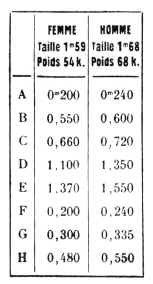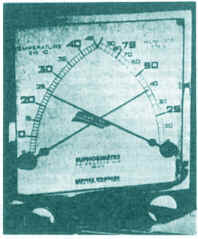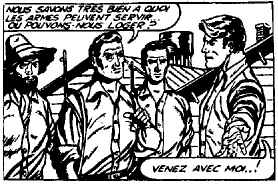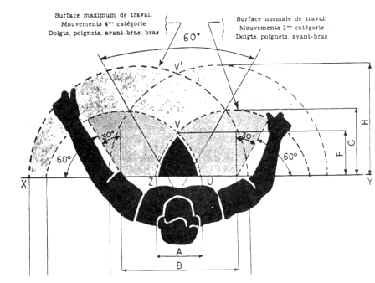|
|
Comments Against Urbanism
Raoul Vaneigem
Internationale Situationniste #6 (August 1961)
Translated by Paul Hammond
Maximum and normal work surfaces in the horizontal plane
AN EXPERT — Chombart de Lauwe — has argued on the basis of precise experiments that the programs proposed by the planners can sometimes create feelings of discontent and revolt, which could have been partly avoided if we had a more profound knowledge of real behaviour, and above all of the motivations for this behaviour.
The grandeur and servitude of urbanism! Having suspiciously and with insistence sniffed out the urban planner, we are obliged to turn away from a lack of breeding and crudeness such as this. There's no question here of incriminating the popular verdict. The people have already declared themselves, with the same incongruity: 'you architect!' has always been, in Belgium, strong language. But since this particular expert sides today with popular opinion and applies himself, too, to sniffing out the planner, there we are, saved! And so the urbanist is officially convicted of inciting discontent and revolt, of 'almost' being the main provocateur in inciting them. We must hope for a swift reaction from the authorities; it would be unthinkable that hotbeds of revolt be openly stirred up by the very same people whose task it is to put them out. There is, here, a crime against social peace which only a council of war can settle. Will we see justice administered within its own ranks? Not unless the expert was only a wily urbanist after all.
If the planner cannot know the behavioural motivations of those he wishes to house in a way that best suits their nervous equilibrium, then urbanism might as well be integrated right now within criminological research (to deflect the actions of provocateurs — see above — and permit each person to keep his place within the hierarchy); in this case, then the science of criminal repression loses its raison d'être and changes its social rationale: urbanism will suffice to maintain the established order without recourse to the tastelessness of machine guns. Man assimilated to concrete, what a dream or what a blessed nightmare for the technocrats, were they to lose it, what still remains of their Higher Nervous activity and be preserved in the power and the hardness of concrete.
If the Nazis had known the contemporary urbanists they would have transformed the concentrations camps into H.L.M.s [Habitations à loyers modérés: rent-controlled apartment blocks]. But that solution appears too brutal to M. Chombart de Lauwe. The ideal urbanism ought to motivate everyone, without discontent or revolt, toward the final solution of the human question.
Urbanism is the most perfect and concrete realization of a nightmare. A nightmare, according to the Littré, is 'a state of acute anxiety that culminates in a startling awakening.' An awakening from what? Who has force fed us to the point of somnolence? It would be as to execute Eichmann as to hang the urbanists. This is to blame the targets when you find yourself on a rifle-range!
Planning is the big word, the biggest of the lot, some say. The specialists talk of economic planning, and planned urbanism, then they give a knowing wink, and, providing the performance is well rendered, all the world applauds. The high point of the spectacle is the planning of happiness. The manager is already leading his enquiry; precise experiments establish the density of tele-spectators; it is a matter of arranging the territory around them, building for them without distracting them from the preoccupations which nourish them through the eyes and the ears. This means assuring to all a peaceable existence and an equilibrium, with the prudent foresight of the pirate in the comic-strip who says: 'Dead men tell no tales.' Urbanism and information are complementary in capitalist and 'anti-capitalist' societies; they organize silence.
 Habitation is the 'drink Coca-Cola' of urbanism. The necessity of drinking is replaced by Coca-Cola. To inhabit is to be at home everywhere, says Kiesler, but such a prophetic truth grabs nobody by the throat: it is a scarf against the increasing cold, even if it evokes a noose. We are inhabited; it is from this point that one should begin. Habitation is the 'drink Coca-Cola' of urbanism. The necessity of drinking is replaced by Coca-Cola. To inhabit is to be at home everywhere, says Kiesler, but such a prophetic truth grabs nobody by the throat: it is a scarf against the increasing cold, even if it evokes a noose. We are inhabited; it is from this point that one should begin.
As public relations, the ideal urbanism is the conflict-free projection in space of the social hierarchy. Roadways, lawns, natural flowers and artificial forests lubricate the gears of subjection, render it lovable. In an Yves Touraine novel the State even offers an electronic masturbator to retired workers; economy and happiness both profit here.
A certain urbanism of prestige is necessary, claims Chombart de Lauwe. The spectacle he offers us makes Haussmann, the man who couldn't conceive of prestige of prestige outside of a rifle-range, seem positively quaint. This time it is a matter of scenically organizing the spectacle around everyday life, to let each person live within the bounds which correspond to the role capitalist society imposes on him, to further isolate him by educating him like a blindman to illusively recognize himself in a materialization of his own alienation.
The capitalist education of space is nothing other than education in a space where one loses one's shadow, where one ends up getting lost by dint of seeking to find oneself in what one is not. What a fine example of tenacity for all those teachers and other licensed organizers of influence.
The layout of a town, its streets, walls and neighbourhoods, form so many signs of a strange conditioning. What sign is recognizable there that could be ours? A few graffiti, words of refusal or unusual gestures inscribed in haste, whose interest does not register with learned positions, if not on the walls of Pompeii, a fossil city. But our cities are more fossilized still. We wish to live in countries of knowledge, among signs as alive as the friends we see every day. The revolution will also be the perpetual creation of signs which belong to all.
There is an incredible leadenness in everything related to urbanism. The word 'to construct' sinks straight to the bottom in a water where other possible words stay afloat. Wherever bureaucratic civilization has spread, the anarchy of individual contruction has been officially consecrated and taken over by the competent organs of power, in such a way that the instinct for construction extirpated like a vice and hardly survives except among children and primitives (irresponsible people, in administrative terminology). And among all those who, for want of changing their own lives, spend them all demolishing and rebuilding their hovels.
Urbanism is the art of reassuring, which it knows how to practise in its purest form: the ultimate courtesy of a power on the point of assuring total control of our minds.
God and the City: Urbanism is the only abstract and non-existent force that can claim to exceed God in the post of porter left vacant by his death. With its ubiquity, its immense goodness, and, perhaps someday, its sovereign power, urbanism (or its project) would indeed have what it takes to frighten the Church, if ever there was the slightest doubt concerning the orthodoxy of power. But not to worry: the Church was 'urbanism' long before power; what has it to fear from a lay St Augustine?
There is something admirable to have coexist in the word 'habitation' some thousands of souls from whom even the hope of a last judgement is taken away. In this sense, the admirable caps the inhumane.
To industialize private life: 'Make your life a business,' such will be the new slogan. To suggest to each person that he organize his environment as a small factory to be run as a miniature enterprise, with its substitutes for machines, its top-quality products, its fixed capital of walls and furnishing, is not the best way for conveying the concerns of those gentlemen who possess a factory for real, a big one, which itself must also produce?
To make the horizon uniform: walls and artificial corners of vegetation assign new limits to the dream and to thought, since to know where it ends is, despite everything, to poeticize the desert.
The new towns will obliterate all trace of the battles traditional towns fought against the people they wanted to oppress. To root out from memory the truth that all quotidian life has its history and, through the myth of participation, to question the irreducible character of the lived, it is in these terms that the urbanists might express the objectives they pursue, if they deigned to set aside for a moment the spirit of seriousness which clouds their thinking. When the spirit of seriousness disappears the sky brightens, everything becomes clearer, or almost; thus, as the humorists well know, to destroy your adversary with H bombs is to condemn yourself to die a long, drawn-out death. How much longer must we make fun of the urbanists before they recognize in their premeditated acts of aggression against us that they are premeditating the plan of their own suicide?
Cemeteries are the most natural green areas, the only ones to be integrated harmoniously in the limits of future cities, as the lost paradises. Prime costs must cease to obstruct the desire to build, so claims the leftist builder. Let him lose no sleep, for this will be soon, when the desire to build will have disappeared.
France has been developing processes that turn construction into a Meccano game (J.-E. Havel). Even in the best case, a self-service is only ever a place where one serves, in the sense that a fork serves to eat.
In mixing Machiavellianism and reinforced concrete, urbanism has a clear conscience. We enter the reign of police niceties. To enslave with dignity.
 A euphorimeter A euphorimeter
|
Building with confidence: the reality of bay-windows cannot hide the fictive communication, the ambience of public places denounces the despair and isolation of private consciousness, the busy filling up of space is measured in dead time.
Project for a realistic urbanism: replace Piranesi's stairs with lifts, transform tombs into apartment houses, line sewers with trees, turn trash-cans into living rooms, pile up the shanties and design all your cities like museums; make use of everything, even of nothing.
Alienation is within reach: urbanism makes alienation tactile. The starving proletariat experienced alienation as a brutal suffering. We will live it in a blind suffering of things. Gropingly feeling different.
Honest and clear-sighted urbanists have the courage of their stylites. Must we make our lives a desert to legitimate their aspirations?
The keepers of philosophical faith discovered the existence of a working class some twenty years ago. At a time when sociologists are joining forces to decree that the working class no longer exists, they, the urbanists, have waited for neither philosophers nor sociologists to invent the inhabitant. Theirs will be the glory to have been among the first to discern the new dimensions of the proletariat. Their definition was all the more precise and concrete since they were able, through training and flexible methods, to guide towards a less brutal yet radical proletarianization of virtually the whole of society.
A warning to the builders of ruins: the urbanists will be succeeded by the last troglodytes of shanty-towns and slums. They will know how to build. The privileged folk of the dormitory-towns will be only able to destroy. A lot may expected from such a revolutionary encounter.
The sacred, by devaluing itself, becomes mystery: urbanism is the Great Architect's final fall from grace.
Behind the infatuation with technology hides a revealed truth, indisputable as such: the need of 'habitation.' The down-and-out know very well what the real nature of such a truth is. He better than anyone gauges, among the trashcans where an interdiction on dwelling obliges him to live, how much building his life and building his home are indistinguishable on the only plane of truth there is, the practical one. But the exile in which our policed world maintains him renders his experience so derisory and difficult that the licensed builder would find in this a pretext for justifying himself — supposing, absurdly, that power were to cease safeguarding his existence.
 "Sure we know what guns are for. . . . Where can you house us?" "Come with me!" "Sure we know what guns are for. . . . Where can you house us?" "Come with me!" |
It appears that the working class no longer exists. Today, many ex-proletarians can have access to the comfort formerly reserved for a minority: so goes the familiar tune. But isn't it rather an increasing quantity of comfort which gives them an itch to make demands? And so a certain organization of comfort, it seems, proletarianizes, as by contagion, all those it contaminates through the power of things. Now, the power of things is exercised through the intervention of the ruling administrators, priests of an abstract order whose only privilege will sooner or later be to reign summarily over an administrative center surrounded by ghettos. The last survivor will die of boredom, just as a spider dies of starvation in the middle of its web.
We have to build fast, there are so many people to house, say the humanists of reinforced concrete. We have to dig trenches without delay, say the generals, there's the fatherland to save. Isn't it a bit unfair to laud the first and laugh at the second? In the era of missiles and conditioning the jest of the generals is at least a jest in good taste. But to erect trenches in the air under the same pretext!
|

 Habitation is the 'drink Coca-Cola' of urbanism. The necessity of drinking is replaced by Coca-Cola. To inhabit is to be at home everywhere, says Kiesler, but such a prophetic truth grabs nobody by the throat: it is a scarf against the increasing cold, even if it evokes a noose. We are inhabited; it is from this point that one should begin.
Habitation is the 'drink Coca-Cola' of urbanism. The necessity of drinking is replaced by Coca-Cola. To inhabit is to be at home everywhere, says Kiesler, but such a prophetic truth grabs nobody by the throat: it is a scarf against the increasing cold, even if it evokes a noose. We are inhabited; it is from this point that one should begin. "Sure we know what guns are for. . . . Where can you house us?" "Come with me!"
"Sure we know what guns are for. . . . Where can you house us?" "Come with me!"
 A euphorimeter
A euphorimeter